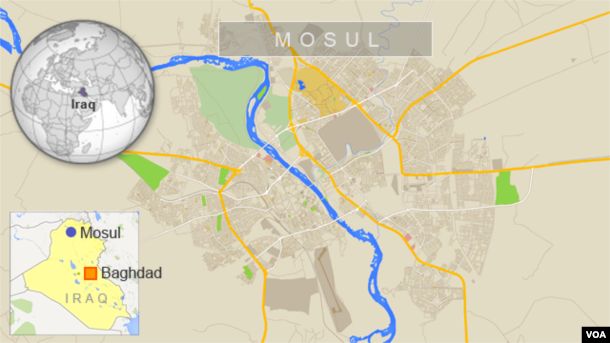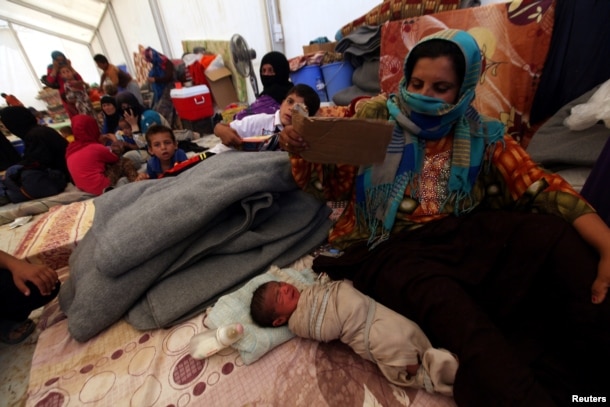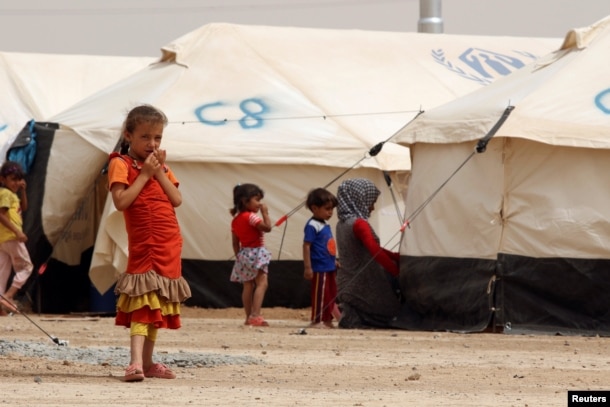
"Faulty Risk Assessment And The Epidemic Spread Of Self-Terrorization
Jenny McCarthy: Poster Girl For Self-Terrorization
Ebola Represents A Trivial Threat To Americans' Health
"Shark Attacks Rise Worldwide: Risk Assessment and Aquinas' Criteria For Sin"
After Fallujah, Iraq Gears Up to Rid Mosul of Islamic State
I
RBIL, IRAQ —
Riding high on Iraq’s victory over Islamic State fighters in Fallujah, Prime Minister Haider al-Abadi confidently said the northwest city of Mosul would be next.
But as Iraq’s second-largest city, Mosul is almost 10 times larger than Fallujah and has 10 times the population.
Military officials warn it will be a much tougher battle. Humanitarian agencies are worried it will be a much bigger humanitarian disaster.
And echoing the U.N.’s concerns over reports of serious human rights abuses against civilians displaced from Fallujah, Sunnis are worried that sectarian abuses in Mosul could be even worse.
Patrick Martin, Iraq research analyst at the Institute for the Study of War, said it is pivotal to see how the Iraqi security forces recapture terrain both leading up to Mosul and within the city itself.

“The force composition is important: what specific units are going to be involved, and making sure that units like the Iranian-proxy Shi’ite militias and compromised federal police are not involved,” Martin told VOA.
“A lot of Sunni Arabs are mistrustful and it could contribute to them being nervous to accepting ISF into their home areas,” Martin said.
Iraqi forces will have to also resettle and protect the civilian population so that they neither come under attack nor are abused by the Shi’ite militias, he said.
Fallujah lessons learned
U.S. officials congratulated Abadi on the recent victory by Iraqi forces over the IS stronghold of Fallujah.
“[Abadi] opened the safe corridors or safe passageways for civilians,” State Department Deputy spokesman Mark Toner said. And he “sent a very clear message that any human rights abuses would be prosecuted and people would be held accountable.”
Nevertheless, there were reports of significant abuses in Fallujah by Iranian-backed militias and by members of Iraq’s federal police, who answer to Iraq’s minister of interior, who is himself a member of the Iranian-backed Badr Organization.
“In Fallujah there were a lot of compromised units, who were seen operating alongside Iranian proxy militias inside Fallujah itself,” Martin said. “This is a major concern for future operations.”
Testifying before Congress this week, Brett McGurk, the special presidential envoy for the Global Coalition to Counter ISIL, acknowledged that while the retaking of Fallujah had been a significant victory, it “has not been perfect."

A displaced woman sits next to her sleeping child at a refugee camp in the Makhmour area near Mosul, Iraq, June 15, 2016.
“There were concerning reports of abuses against civilians in the early stages of the operation and the outflow of people initially overwhelmed the U.N. and humanitarian organizations,” McGurk said.
Mosul
For the past six months, the U.S.-led coalition has been working with local forces in Iraq and Syria to isolate Mosul from its supply routes in Syria.
And there are now 20,000 Sunni tribal fighters working with Iraqi forces to clear and hold territory.
But Mosul is not simply a military challenge.
“It is a political, economic, diplomatic and humanitarian challenge that, if not done right, may well outstrip the capacity of the Iraqi government, and the Kurdistan Regional Government, to manage alone,” McGurk said.
“The only way it can succeed is if everybody – Iraqi forces, Kurdish peshmerga, and local fighters from Ninewa – work together as part of a coordinated political-military plan," he said.
Getting consensus on that plan has been difficult.
Consensus
Last week, Iraqi Kurdistan’s regional President Masoud Barzani met with Iraqi National Security Advisor Faleh Fayyad, as well as McGurk and U.S. Ambassador to Iraq Stuart Jones, to discuss the Mosul operation.
The meeting covered planning and talks on funding 15,000 local fighters, as well as post-IS political arrangements, McGurk said.
The challenge arises from all the different players having different political objectives – even if they all have the same overarching goal of eliminating IS.

Displaced children, who fled from the Islamic State violence, gather at a refugee camp in the Makhmour area near Mosul, Iraq, June 17, 2016.
Iraq’s Shi’ite political forces, some of them strongly backed by Iran, want to establish clear control over the nation. Shi’ite militia are accused of sectarian violence.
Iraq’s Sunnis, many of whom remember the bitter war against Iran in the 1980s, have little trust in Shi’ite leadership, are fearful of the Shi’ite militia, and want to restore their political power.
Kurds are believed to be making use of the IS fight to delineate what they consider their border and tip the regional demographic in their favor for a future independent Kurdistan, and have little time for Iraqi Arab Sunnis or Shi’ites.
“Their participation in operations to capture Mosul itself would create a lot of instability and fear,” said Martin, the Iraq research analyst. “Sunni Arabs and Kurds in this area were very much at odds” even before IS swept into control.
“It is already going to be an issue in Sinjar,” said Martin, referring to the area the Kurdish peshmerga retook from IS. So far, the peshmerga have not allowed Arabs to return to their homes in the area. “This thing will be very contentious."
No comments:
Post a Comment